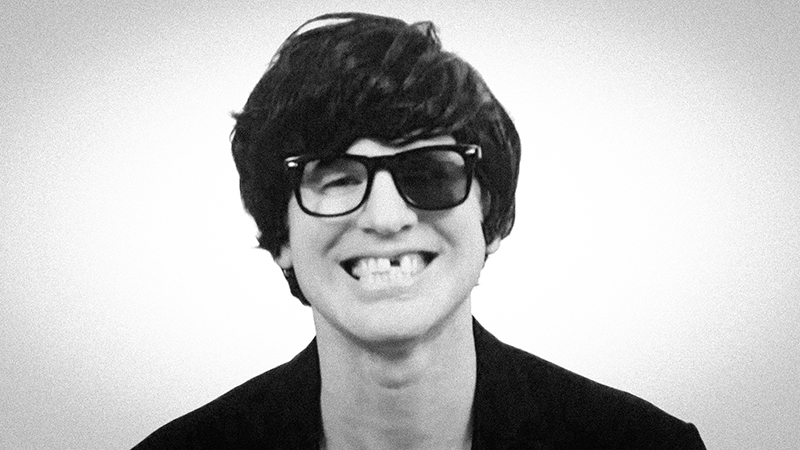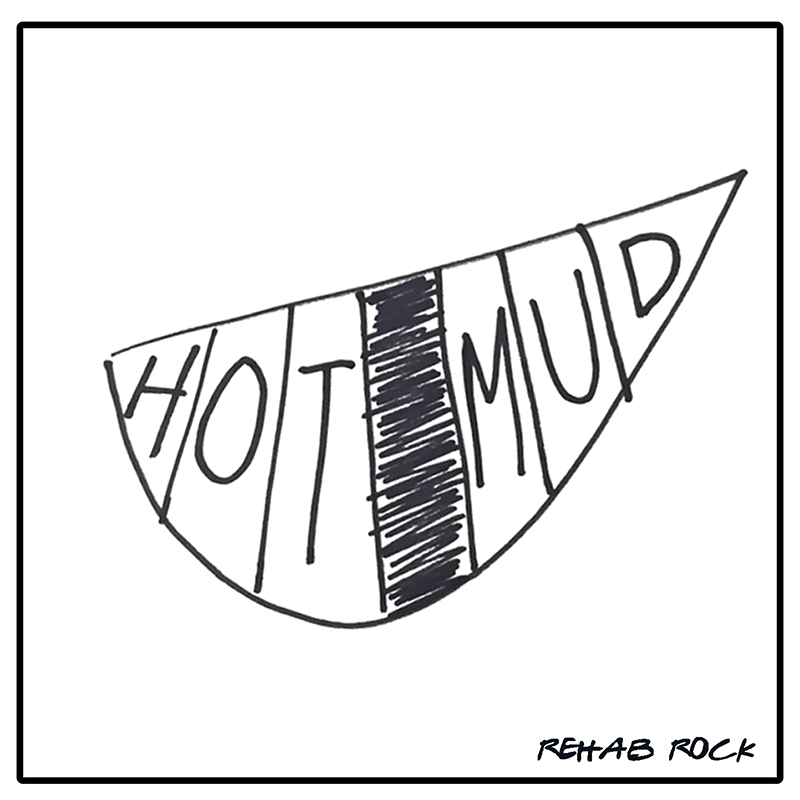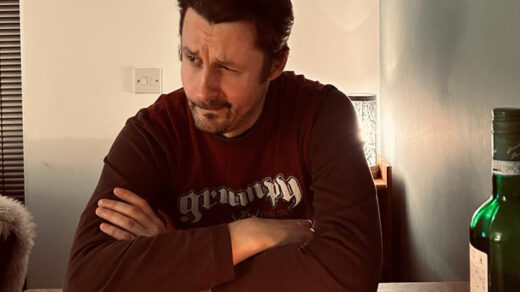Written and Recorded at a Rehab Facility With Broken Equipment and Instruments
Written and recorded while in rehab, artist Hot Mud created an entire album during his stay using the facility’s broken computers and instruments. What we get is raw, authentic art. When we heard the focus single from the album, “Where the Bad Kids Go”, we knew there was something special happening here, and when we heard the story of Muddy’s journey to sobriety, we knew there was going to be a lot of great music to be made in the future. We want to follow up this interview in the future with the music he releases using real instruments and recording gear.
“Where the Bad Kids Go” is a song that embraces the dirty glamour and mystery of living in the dark, dangerous world of drugs and inebriation. Hot Mud captures the scene perfectly with his raw vocals, catchy chorus, and stark production style reminding us of the early White Stripes recordings.
“I had no ambition or motivation and felt like I had no purpose.
I was lost.” – Muddy Watters
Our exclusive interview with the artist:
SBN: Hot Mud is described as an alter ego of a man named Muddy Watters. Can you share the story behind how this alter ego emerged and its connection to Muddy Watters?
HM: My given name is Muddy Watters, I was named after the famous blues musician. Hot Mud was a self-proclaimed nickname for my wild and intoxicated behaviour. “Look out, Hot Mud is here and ready to get crazy!”
I kept being told I was a completely different person, a stranger when I was inebriated. I guess I started blaming Hot Mud for all the terrible and foolish things I would do. When it came time to put some visual aspect to the music, I wanted to show a broken, beaten, and strange-looking character who was completely delusional, thinking they looked and acted cool, but in fact, they were not.
One day I woke up at the hospital with a bloody face and a broken smile, which does absolute wonders for your self-confidence (said sarcastically). I remember in school discussing ‘branding’ and the image of Hot Mud came to mind. I turned my insecurities into a superpower, it was something that made me different and unique. I started Hot Mud’s image from the broken smile, then came the broken dark sunglasses, and then topped it off with the tacky looking dark hair.
SBN: We understand you created this album while in rehab, but we assume you were a working musician or producer before entering. Were you a touring artist, working as a producer, or has music been a side project for self-expression?
HM: Music was a passion for as long as I can remember. My father, Pat Watters, taught me how to play the blues. One of my brothers, Danny Watters, and I were very close growing up. A big part of our friendship was making music together. We made all types of music: rap, punk, heavy metal, surf, funk, and all kinds of experiments. Our first real honest effort at writing pop and rock n roll songs was simply called “Watters Brothers”. We self-produced 3 albums in our ‘Rock n Roll Mansion’ and played gigs around Ontario and Quebec for a few years. It was incredibly fun, and we had a few successes along the way. Our last record was out in 2010. It was around that time I started losing focus and was probably no fun to be around for the next 10 years or so.
SBN: Looking back at the entire journey from the emergence of Hot Mud to the release of ‘Rehab Rock,’ what message or advice do you have for others who may be on a similar path of self-discovery and recovery through music?
HM: If you are struggling with addiction, don’t be afraid to ask for help. There was no way I was going to get clean on my own. I had several half-hearted failed attempts at it with no success. Sure, I could stop for a while, but to truly kick it and become a sober person I couldn’t have done it if I didn’t go to rehab. I was so surprised at the amazing places, services, and helpful people I came across. If you really want it, there are options out there to make it a reality.
As far as creating goes. You are lucky to have that creative spark, use it! It’s a superpower. It’s a great distraction, it keeps you busy, and out of trouble. Keep a journal. Write down your feelings and thoughts. Don’t be afraid to be emotional and honest.
I met a lot of people in recovery who didn’t have that creative outlet to help them with the process, and it made me feel incredibly lucky that I had that passion in me to turn to and rekindle during that messed up emotional time, it made it a lot easier for me. Creating things, setting deadlines, and completing things are great steps to building self-confidence and purpose. The ability to dream and imagine are some of the most beautiful things about life. If you can do that in a positive way you will want to keep on living for a while.
SBN: Layering tracks onto a broken computer with broken instruments, some found in the rehab facility’s basement, paints a vivid picture. How did these limitations shape the sound and production style of ‘Rehab Rock’?
HM: I thought a record made by a broken man using broken instruments made a lot of sense for this project. It was important to me that it was recorded in my rehab room only. I really wanted it to sound exactly like what it was – a lo-fi indie rock record made in rehab. I wanted it to sound like a broken dream reaching from a tiny rehab bedroom window out towards the stars.
I was never really that technical before, so I had to learn a lot of basic audio production on the fly while I was recording these songs. My brother, Danny Watters, helped with some overall eq on the finished tracks to make it a little less painful on the ear drums.
SBN: We particularly love “Where the Bad Kids Go”. We hear some influences here, perhaps the UK’s Arctic Monkees or New York’s The Strokes. Are we on target here?
HM: Ya, I can hear some similarities. I think Arctic Monkeys were big fans of The Strokes and The Strokes were big fans of The Velvet Underground. The Velvet Underground was a big influence for me too. They were writing songs about addiction and people were really digging it. They gave me the confidence to say some of the things you hear on ‘Rehab Rock’. They were hanging out with Andy Warhol who is a big influence too.
SBN: The journey to rehab is mentioned as a rocky road. Could you elaborate on the pivotal moments that led you to seek treatment and embark on the path to recovery?
HM: Yikes! Ok well, I’ll say that it was years and years of using and abusing that brought me to my knees. It got to a point where my life was unmanageable, I couldn’t function in society. I couldn’t keep a job; I couldn’t keep a home. Every penny I had would go towards getting drunk or stoned before anything else. I was in all kinds of trouble all the time, banned from many public places in the city, and most of the police officers and ambulance drivers knew my name.
Physically I was very sick and exhausted. Mentally I was angry, depressed, full of guilt and shame, feeling misunderstood and alone, feeling sorry for myself.I was intoxicated as much I could be, and any chance I could get, from the moment I woke to the moment I blacked out, hoping maybe I wouldn’t wake up.
I had no ambition or motivation and felt like I had no purpose. I was lost.
Luckily, I had a very supportive family that stuck with me through all the brutal nonsense I was putting them through.One day my dad drove me to the door of a rehab facility, I walked in and asked for help, the rest is history.
SBN: It must be a huge sense of accomplishment to make and release the album. So many artists record music that never gets heard. Are you working on new music in studios with better equipment and instruments?
HM: You know, I am proud of myself for releasing this record. I was sitting on it for a while questioning whether to do it or not. I’m putting myself out there with this one, and it’s all the bad and embarrassing parts of me. Although I hope people see Hot Mud as a hero in the end, because ultimately, I won the battle. I literally put a lot of blood, sweat, and tears into the making of this.
But it wasn’t until I recorded a follow-up album that I really felt the need to release ‘Rehab Rock’ to the world. In the long run, it will go down as a great introduction to the weird, wild, and wonderful world of Hot Mud.
Yes, you heard that right. I have a sequel pretty much ready to go, it will be released this year as well. It will continue the story of Hot Mud but with a more positive, upbeat, and accessible sound. As far as instruments and equipment go, I discovered midi.
SBN: Spending over a year in treatment facilities is quite a long time. Are you feeling like you are lucky to be alive and given a second chance?
HM: Ya I spent a long time in rehab. It was in 2 different facilities. The first place was in a small town where I went to high school. It was kind of funny because I remember as a kid walking by that place thinking “That’s where the crazy people go.” Well sure enough there I was years later. I spent 3 months there away from the city that I was stumbling around in. That was a big help to get away from the routine stomping grounds. Then I went back to the city into a different facility where I eventually settled into second-stage sober living. I was given the opportunity to stay there while I completed a college diploma, got a job, an apartment, and back on my feet. More on that story in the sequel.
So ya, absolutely! I really do feel like it’s a second life. Anything from this point is a bonus. It helps with my fear of criticism and judgment from others because I should be dead by now, nothing can be worse than that.
SBN: The press release mentions that your “attitude towards life and purpose is now clear” What is your attitude toward life and your purpose? We all wish to find the answers to these questions.
HM: I think everyone must find that answer for themselves. For me, there’s nothing left to lose and so much to create…





